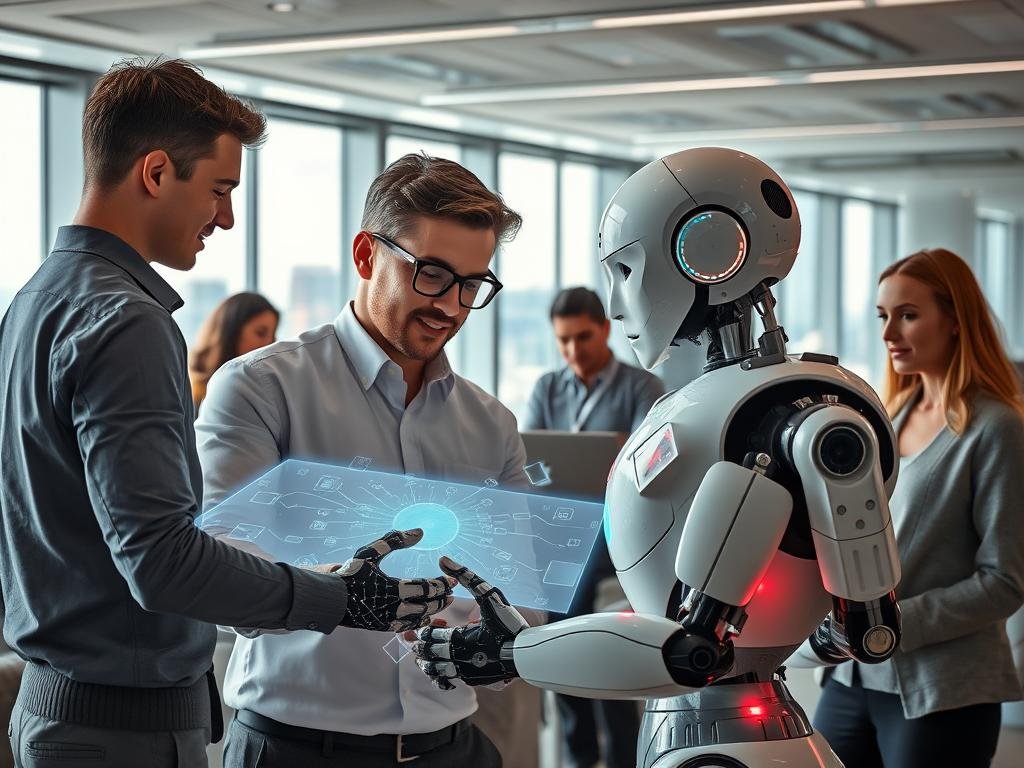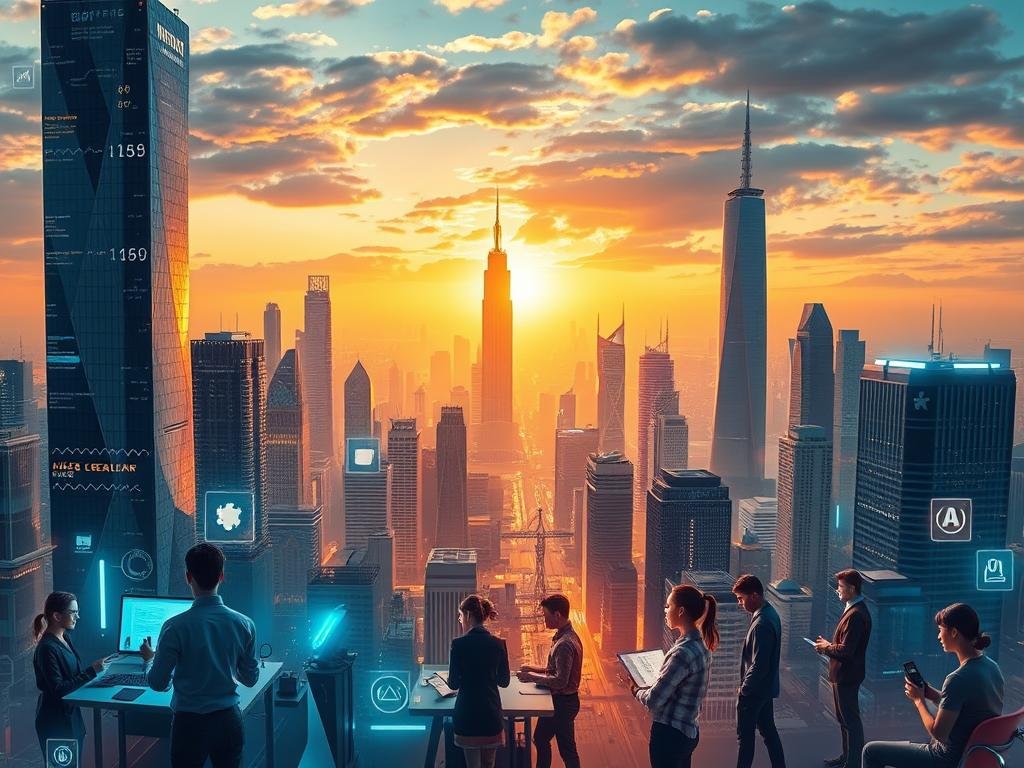You’ve probably heard the rumors: Artificial Intelligence is taking our jobs. But is that really true? Goldman Sachs says AI might automate up to 300 million full-time jobs. Yet, this isn’t the whole story.
The future of work isn’t just about losing jobs. It’s also about new roles, skills, and industries thanks to Artificial Intelligence. As we move forward, it’s key to grasp how AI affects the job market.
Key Takeaways
- The ai job revolution is changing the global workforce.
- Artificial Intelligence is both replacing jobs and creating new ones.
- Understanding the future of work ai is vital for this shift.
- The ai impact on jobs differs across industries.
- New roles and skills are emerging due to Artificial Intelligence.
Understanding the AI Job Revolution: A Current Snapshot
AI is changing the job market fast. It’s important to know how it affects work. AI is being used in many areas, changing how businesses work and jobs.
Key Statistics on AI Adoption in the Workplace
Studies show AI is being used more in work. A McKinsey report says nearly 50% of companies use AI in at least one area. The AI market is also growing fast, by over 40% every year for the next ten years.
- AI might replace up to two-thirds of jobs, Goldman Sachs says.
- The pandemic has made AI use even more common, with more people working from home.
- Jobs in manufacturing, customer service, and transportation are being changed a lot by AI.
Industries Most Affected by Automation and Employment
AI affects jobs differently in different fields. Jobs with lots of repetition are more likely to be automated. For example, a study shows manufacturing and customer service are at high risk.
- Manufacturing: AI robots are doing more assembly and production work.
- Customer Service: Chatbots and virtual assistants are taking over human customer service roles.
- Transportation: Self-driving cars are being tested and might replace human drivers.
The Acceleration of AI Integration Post-Pandemic
The pandemic has made companies use AI more. With more people working from home, companies had to quickly find digital solutions. This has led to more investment in AI, changing the job market even more.
As AI and jobs change, it’s key to understand these changes. The future of work will depend on how well we adapt to AI’s impact.
The Reality of AI Job Displacement
AI is changing the job market in big ways. The World Economic Forum says 85 million jobs could be lost to AI and automation by 2025. But, 97 million new jobs might also appear. This shows we need to see both the challenges and chances AI brings.
Categories of Jobs Most Vulnerable to Automation
Some jobs are more likely to be automated than others. These include:
- Data entry and processing roles
- Manufacturing and assembly line work
- Customer service positions
- Transportation and logistics jobs
- Bookkeeping and accounting roles

Timeline Predictions for AI Replacement from Leading Experts
Experts have different ideas about when AI will replace jobs. Here’s what they say:
| Expert | Prediction | Year |
|---|---|---|
| Andrew Ng | AI will automate many tasks, but new jobs will emerge. | 2025 |
| Elon Musk | AI could lead to a universal basic income. | 2030 |
| Mark Zuckerberg | AI will create new opportunities for human-AI collaboration. | 2027 |
Real-World Case Studies: Jobs Already Transformed by AI
AI has already changed many industries. For example:
Manufacturing: AI robots are now on assembly lines. They make things faster and cheaper.
Customer Service: Chatbots are taking over customer service. They let humans focus on harder tasks.
These examples show how AI is changing jobs in real life.
AI-Driven Job Creation: The Emerging Opportunities
AI is changing the job market in big ways. It’s not just about automating jobs. It’s also creating new roles that are reshaping the job world.
New Roles in AI
AI has introduced 7 new job categories linked to its use. Some of these roles include:
- Prompt Engineer
- AI Ethics Specialist
- Health Tech Implementation Specialist
- AI Trainer
- AI Explainability Specialist
- AI Data Analyst
- AI Solutions Consultant
These jobs are in high demand and offer good pay and career growth.
Industries Experiencing Growth
AI is boosting growth in many sectors, like:
- Healthcare: AI helps improve patient care, makes clinical work smoother, and cuts costs.
- Finance: AI spots fraud, predicts market moves, and optimizes investments.
- Manufacturing: AI boosts production, predicts when things need fixing, and improves product quality.
These areas are growing fast because of AI, opening up new job chances for skilled people.
The Multiplier Effect
AI’s impact on jobs goes beyond just AI-related roles. It has a multiplier effect on job creation, sparking new roles in unrelated industries.
For instance, AI in healthcare has created a need for AI-trained nurses and healthcare data analysts.
As AI keeps evolving, we’ll likely see even more new job types. This will give professionals chances to learn and grow.
The Human Advantage: Skills AI Cannot Replace
In today’s world, your human skills are more valuable than ever. As AI handles routine tasks, your creativity, management skills, and emotional intelligence shine brighter.

Human Capabilities That Give You an Edge Over Machines
AI is great at data and math, but humans have unique skills. Creativity, critical thinking, and emotional understanding are hard for machines to match. Recent talks show empathy, problem-solving, and adaptability are key in an AI world.
The Growing Demand for Human-AI Collaboration Skills
With AI in the workplace, the need for human-AI teamwork grows. It’s not just about knowing AI; it’s about working with it. Human-AI collaboration is vital in fields like healthcare and finance, where AI helps human decisions.
To master these skills, you need to understand both humans and machines. It’s about reading AI outputs, knowing when human judgment is needed, and sharing insights with everyone.
Emotional Intelligence as Your Career Differentiator
Emotional intelligence is key in the job market. As AI handles analysis, emotional smarts make humans unique. It helps in building strong relationships, leading, and handling social challenges.
In a world where AI does more, focusing on emotional intelligence is vital. It makes you more valuable and opens up more career paths in a fast-changing job market.
To stay ahead, focus on reskilling for AI. Learn skills that work with AI, not against it. This way, you’ll stay relevant and competitive in an AI-driven economy.
10 High-Growth Career Paths in the AI Economy
The AI-driven future is bringing new career paths to light. The AI economy is not just about making things automated. It’s also about opening up new opportunities that we never thought possible. You can take advantage of this by looking into the high-growth careers in AI.

Technical Roles: AI Engineers, Data Scientists, and ML Specialists
Technical roles are leading the AI revolution. AI engineers are needed to create and use AI solutions. Data scientists analyze data to help make business decisions. Machine Learning (ML) specialists work on algorithms that let machines learn from data.
These roles are key for businesses wanting to use AI. You can grow your skills in these areas to meet the demand.
AI Ethics and Governance Professionals
As AI spreads, the need for ethical use grows. AI ethics and governance professionals create policies to stop AI misuse. They balance innovation with ethics, making it a challenging yet rewarding job.
If you’re interested in AI’s ethics, this could be a rewarding career for you.
Human-AI Collaboration Managers
The future of work will see humans and AI working together. Human-AI collaboration managers make sure AI fits well in the workplace. They need to know AI’s tech and human needs.
This job needs both tech and people skills, making it exciting for those who like working with technology and people.
Industry-Specific AI Implementation Experts
Different fields face unique AI challenges. Industry-specific AI implementation experts create AI solutions for each field. Whether it’s healthcare, finance, or manufacturing, they help businesses use AI.
By focusing on a specific industry, you can become an AI expert. This gives you valuable insights to businesses wanting to use AI.
In conclusion, the AI economy offers many career paths. From AI engineering and data science to AI ethics and human-AI collaboration, there are many opportunities. By understanding these paths, you can set yourself up for success in the AI future.
Reskilling Strategies for the Future of Work with AI
In today’s world, reskilling is a must for keeping your career on track. AI is changing jobs fast, so you need new skills to keep up. These skills should match the latest tech trends.
6 Essential Technical Skills Worth Developing Now
To stay relevant in the AI job market, learn these technical skills:
- Programming skills in languages like Python, R, or SQL.
- Data analysis and interpretation to make informed decisions.
- Machine learning basics to grasp AI’s role.
- Cloud computing for handling big data.
- Cybersecurity to safeguard AI systems.
- AI ethics for responsible AI use.

Non-Technical Skills That Complement AI Systems
Non-technical skills are just as vital in an AI world. Work on these:
- Creativity to innovate and solve problems.
- Critical thinking to assess AI insights.
- Emotional intelligence for better human-AI teamwork.
- Communication to share AI-driven ideas clearly.
- Adaptability to keep up with AI changes.
Resources and Programs for AI-Related Upskilling
Many groups and platforms help with AI upskilling. For example, Amazon is spending $1.2 billion to retrain 300,000 workers for tech jobs. Here are more resources:
- Online courses on Coursera, edX, and Udacity.
- AI and machine learning certifications.
- Industry events and workshops for AI updates.
Use these resources and focus on both tech and non-tech skills. This way, you’ll be ready for the AI economy.
Corporate Responses to the AI Job Market Growth
Businesses are now focusing on transforming their workforce. They are doing this through reskilling and upskilling initiatives. As AI automates tasks, companies are adapting their employees’ skills to work with these new technologies.
Progressive Approaches to Workforce Transformation
Companies like Amazon and IBM are leading this transformation. They are investing in programs to help employees develop new skills. A report by McKinsey shows that proactive companies are more likely to thrive in an AI-driven economy.
“The future of work is not just about technology; it’s about people,” says a leading expert in AI and workforce development. “Companies that prioritize employee development and create a culture of continuous learning will be better positioned to capitalize on the opportunities presented by AI.”
Internal Reskilling Programs: 5 Successful Case Studies
Several major corporations have implemented successful internal reskilling programs. For instance:
- AT&T’s Workforce 2020 program, which retrained over 100,000 employees
- IBM’s Digital-Nation initiative, focusing on digital skills training
- Amazon’s Upskilling 2025 program, aiming to train 100,000 employees in emerging technologies
- Siemens’ Skills for Industry 4.0 program, focusing on Industry 4.0 skills
- Accenture’s Future Workforce Program, stressing skills like AI, cloud computing, and data analytics
These programs show the commitment of leading companies to reskill their workforce. They are preparing employees for the challenges and opportunities presented by AI.
Ethical Considerations in AI-Driven Workforce Changes
As companies implement AI-driven workforce changes, they must consider ethical implications. This includes ensuring transparency in AI decision-making processes. They must also address biases in AI systems and support employees who may be displaced by automation.
According to Digital Vista Online, ethical AI adoption is key. It helps maintain public trust and ensures AI benefits are shared fairly.
By focusing on ethics and investing in workforce transformation, companies can mitigate AI risks. They can also unlock new opportunities for growth and innovation.
Global Perspectives: How Different Regions Address AI Employment Trends
The AI job revolution is changing the world in different ways. Each region faces its own challenges and opportunities. It’s important to understand these differences as we move forward.
United States: Tech Industry Careers and Policy Approaches
The United States leads in AI development, thanks to tech industry careers. Tech giants are creating and using AI in many fields. The U.S. government is working on policies to help with AI’s impact on jobs.
For example, the AI Initiative by the U.S. Department of Labor helps workers adapt. It focuses on upskilling and reskilling to keep the workforce relevant in an AI world.
European Frameworks for AI and Employment Protection
Europe is taking a different path, focusing on rules to protect jobs and encourage AI. The European Union’s AI regulatory framework aims to ensure AI respects human rights and privacy.
This includes steps to avoid job displacement and promote AI for social good. The EU is using technology to solve big problems.
Emerging Economies: Unique Challenges and Digital Transformation Jobs
Emerging economies face special challenges with AI. They can skip old industrial steps and jump straight to digital tech. But, they also risk losing jobs.
Countries like India and Kenya are investing in digital infrastructure and IT education. They’re creating digital transformation jobs in areas like e-commerce and digital services.
By looking at these global views, you can better understand the AI job revolution. You can find new opportunities for growth in your career or business.
Your Personal AI Job Search Strategy
In today’s world, your job search must be as smart as AI. You need to stay ahead by using the latest AI tools and trends. This will help you succeed in a changing job market.
Developing an AI-Proof Career Path
To build a career that stands up to AI, focus on skills that AI can’t replace. Develop human capabilities like creativity, critical thinking, and emotional intelligence. These skills will give you an edge over machines.
Think about learning more about AI and machine learning. This can make you more employable and put you at the cutting edge of tech.
Building Your Personal Brand in the Age of Machine Learning
Your personal brand is key in an AI-driven job market. It’s about showing what makes you special and valuable. Start by defining who you are professionally and what values you bring.
Use digital platforms to build a strong online presence. Create content, join professional networks, or show off your work on LinkedIn or GitHub. This helps you stand out.
8 Networking and Community Resources for AI Career Growth
Networking is vital in the AI job market. Here are some tips and resources to help you grow your career:
- Join online communities and forums related to AI and your field.
- Go to conferences, workshops, and webinars to learn about new AI trends.
- Take part in hackathons or collaborative projects to build your network and show your skills.
- Connect with leaders and professionals on LinkedIn or Twitter.
- Join AI-focused professional organizations or groups.
- Volunteer for projects to get hands-on experience with AI.
- Use social media to share your insights and engage with AI-related content.
- Start a personal project or blog to show off your AI expertise.
By focusing on these areas, you can create a strong AI job search strategy. It will prepare you for today’s market and set you up for success in the future.
Conclusion: Embracing Change in the AI-Driven Economy
The future of work will be greatly influenced by AI, bringing both challenges and opportunities. Up to 800 million jobs could be lost worldwide by 2030 due to automation. Yet, up to 140 million new roles might emerge. It’s vital to be ready for these changes.
The AI revolution is set to add over $15 trillion to the global economy by 2030. This will change industries and open up new chances.
To succeed in this ai-driven economy, being adaptable and committed to lifelong learning is key. Developing skills that work well with AI and focusing on human strengths can help you stand out. Embracing change and seeking new opportunities will be essential for the future of work.
As you look ahead, use the resources and strategies from this article to stay on top in the AI job market. This way, you’ll be ready to take advantage of the opportunities in the AI-driven economy. It will ensure a bright future for your career.
FAQ
What is the AI job revolution, and how is it impacting the job market?
The AI job revolution is changing the job market a lot. It’s making some jobs disappear and creating new ones. This is changing how we work and what work looks like.
Which industries are most affected by AI adoption and automation?
AI is changing jobs a lot in industries like manufacturing, customer service, and transportation. It’s also changing data processing jobs. These areas are seeing big changes because of AI.
How has the pandemic accelerated AI integration in the workplace?
The pandemic made businesses use AI more. They had to find digital ways to keep working. This led to more AI use in many fields.
What categories of jobs are most vulnerable to AI job displacement?
Jobs that are repetitive, deal with data, or have set actions are at risk. Examples include some jobs in manufacturing, data entry, and customer service.
What new job categories have been created by AI?
AI has brought new jobs like AI engineers and data scientists. There are also machine learning specialists and jobs in AI ethics. These roles are in demand as AI changes work.
How can you develop skills that are complementary to AI systems?
Focus on skills like emotional intelligence and creativity. These are hard for AI to do. They’re valuable in today’s job market.
What are the key technical skills worth developing for a career in AI?
For AI careers, learn programming languages like Python and R. Also, know data analysis and machine learning. Keeping up with new tech is important.
How are corporations responding to the AI job market growth?
Companies are adapting to AI by training their workers. They’re also thinking about AI’s ethics. This helps them keep up with the job market and keep good employees.
What is the importance of human-AI collaboration skills in the future of work?
Knowing how to work with AI is key for the future. It means understanding AI, its outputs, and making decisions with AI help.
How can you build a personal brand in the age of machine learning?
Show off your skills that go well with AI. Use online platforms and events to be seen as an expert. This helps build your personal brand.
What are the emerging trends in AI employment globally?
Global trends include more tech jobs and new AI rules in Europe. Emerging economies face challenges in using AI. These are big changes in AI jobs worldwide.
How can you prepare for an AI-driven job market?
Mix technical and non-technical skills. Stay flexible and always learn new things. Knowing AI and its uses in your field is essential.






